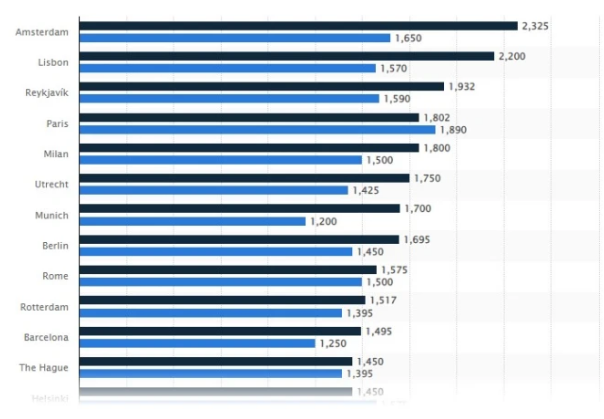Finding Affordable Housing, the Biggest Challenge when Emigrating.

As EURES advisers, we often say among ourselves: “It’s now easier to find a job than affordable housing in Europe”. And that’s the biggest obstacle for almost everyone considering emigration.
The housing shortage and ever-increasing rental and purchase prices have become a European problem affecting most countries. Especially in metropolitan areas, finding affordable housing is a major challenge.

Average monthly rental price for a furnished 2-room apartment in various European cities in Q3 2021 and Q3 2022.
We don’t have the illusion that we can offer a ready-made solution in this blog. However, we hope to give you tips that can help you find suitable housing more easily.
No matter how you look at it, finding suitable and affordable housing largely determines how well you settle in your new country. So it’s crucial to succeed in this!
It’s not just the price that’s challenging. A different language, local laws and regulations, and cultural differences make the local real estate market even less accessible for newcomers.
For example, in Spain, you can’t rent or buy anything without a NIE number, and when purchasing property there, you almost always need a lawyer.
This example already shows that the differences in the housing market between member states are significant. Make sure you clearly understand what formalities need to be arranged beforehand to access the local housing market and what resources are available to find housing.
You’re not alone in this; EURES can help guide you. We don’t find housing for you, but we know which resources to use and what matters need to be arranged in advance. If your EURES adviser in the Netherlands doesn’t know the answer? Then they can always rely on their European colleagues, as we are a network aimed at promoting labor mobility. You can also directly contact European EURES advisers by phone or email via EURES – Search for EURES Advisers – European Commission (europa.eu) or by chat Chat with EURES Advisers (europa.eu)
Don’t underestimate your own network! In many countries, there’s also a rental market that doesn’t operate through “official” channels. Do you know people or even have friends or family in the destination country? Let them know you’re looking for housing and ask for help.
Social media can also be a practical tool for finding housing. Facebook groups like “Dutch people in…” are numerous. There you’ll find people who have gone before you and know their way around. It’s not unusual to post a request in such a Facebook group. However, remain alert and realistic: if something seems too good to be true, it usually is. Never pay a deposit or security deposit without seeing the accommodation in person or without first receiving a key!
Renting a furnished property offers advantages. It gives you time to get used to your living environment. Don’t like it? Then moving to another rental property is very easy.
A practical website for finding furnished accommodation is HousingAnywhere: Mid to Long-Term Rentals in 400+ cities
Definitely discuss the topic of “housing” with your future employer. More and more employers, especially those experienced in hiring people from abroad, are familiar with this problem. Because the labor market is so tight, there’s often an understanding that help with finding housing is necessary to successfully recruit people from abroad. They might offer support or provide accommodation for the first few weeks, giving you space to orient yourself locally. Particularly in the tourism sector and contact centers in Southern and Eastern Europe, it’s common to receive help or have housing included as part of the salary.
Just like in the Netherlands, job opportunities are greatest in cities, but on the flip side, the chance of finding affordable housing there is smallest. However, this doesn’t have to be a conflict – analyze how accessible the region is. A characteristic of a large city is that it often has good public transport connections with the region. A half-hour train journey can make a big difference in housing supply and price.
Did you know that there are also possibilities to apply for subsidies when you go to live and work in another EU/EEA country? Ask your EURES adviser about it or check EURES Targeted Mobility Scheme (europa.eu)
Unfortunately, there are no ready-made solutions to solve the housing problem in this blog, but with a little help and good preparation, the solution does come closer.
This article was created in collaboration with EURES Spain.
